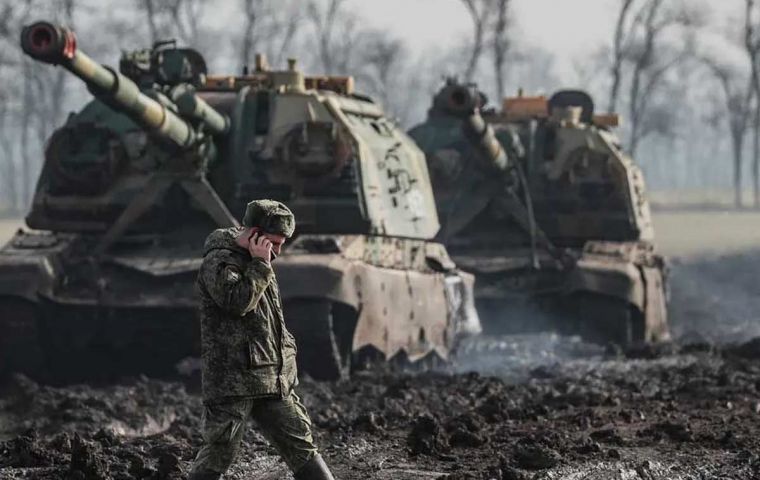MercoPress. South Atlantic News Agency
Rasputitsa or General Mud joins the Ukrainian resistance against Russian invasion
 “There were already numerous episodes when Russian tanks and other equipment drove into the fields and got stuck. So the soldiers had to leave the equipment”
“There were already numerous episodes when Russian tanks and other equipment drove into the fields and got stuck. So the soldiers had to leave the equipment” Ukrainian farmers call it Rasputitsa, and military experts, ”General Mud', the twice-yearly phenomenon which causes muddy conditions on roads as snow thaws in spring plus wet weather, and the heavy rainfall in autumn.
In war time, mechanized divisions must keep to well paved roads or be exposed to the mud that halts and sucks heavy equipment, not to mention tanks, no matter how powerful they might be.
The bread basket of Europe with its incredibly fertile soil becomes in those two seasons, a quagmire.
As Russian president Vladimir Putin massed his army at the Ukrainian border, many Western experts expected him to abstain from marching in as the weeks passed, because time was running out before the great thaw.
“Early spring is a bad time to invade Ukraine if the main roads have been destroyed, a task well within Ukraine's irregular warfare toolkit,” wrote Spencer Meredith, a professor at the US National Defense University, in an article published a week before Putin gave the order for the invasion.
While some experts may have misread Putin's intentions, their assessment of weather conditions has been spot-on, as pictures of Russian tanks stuck in the mud have begun to appear frequently on social media.
“There were already numerous episodes when Russian tanks and other equipment drove into the fields and got stuck. So the soldiers had to leave the equipment and go on foot,” said Mykola Beleskov, an Ukrainian military analyst.
A video of a Ukrainian farmer towing away a tanks has become viral.
The situation is expected to worsen as rains start, before conditions change. If history is indicative of what can happen even to the greatest of armies, in 1812 the retreat by French emperor Napoleon's troops could not be completed in time before the harsh winter because it was severely slowed down by mud.
Some eight decades ago the heavy Ukrainian soil got in the way of Hitler's march on Moscow, and later of Russia's counter-offensive of 1943.
Like during those historic campaigns, the Rasputitsa is expected by the second half of March and to last for three to four weeks.
Worsening conditions will leave Russian generals little choice but to order tanks and armored vehicles to stick to the main roads, making them more vulnerable to attack, according to Michel Goya, a military historian.
Overall several Western experts believe Putin could have under estimated the Ukrainian people resistance and overestimated his forces, and in either situation the mud of the fertile soils is becoming a major factor in the Ukraine conflict.




Top Comments
Disclaimer & comment rulesCommenting for this story is now closed.
If you have a Facebook account, become a fan and comment on our Facebook Page!